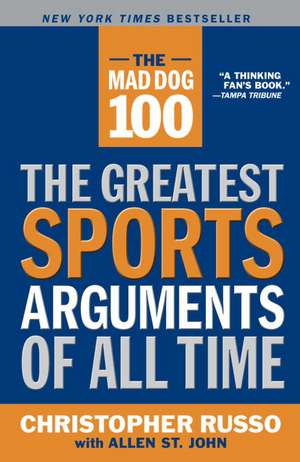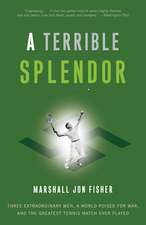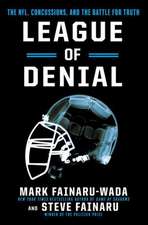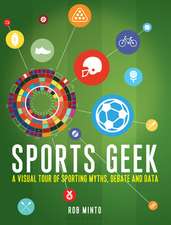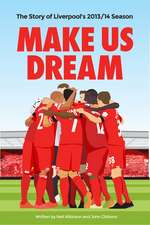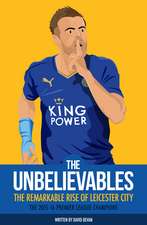The Mad Dog 100: The Greatest Sports Arguments of All Time
Autor Chris Russo, Allen St. Johnen Limba Engleză Paperback – 31 mai 2004
Sports fans
Which was the greater achievement, Ted Williams’s .406 season or Joe DiMaggio’s 56-game hitting streak?
Who would dominate the ultimate Pebble Beach showdown? Ben Hogan or Tiger Woods?
Who was really the most important athlete of the twentieth century?If you love sports, there’s only one thing better than a good game—and that’s a good argument. Who’s the best ever? The worst ever? Underrated? Overpaid? Now, in his long-awaited and completely original book—updated for the 2003 sports season—Christopher “Mad Dog” Russo sets up and breaks down the hundred greatest sports arguments of all time. In classic Mad Dog style, each chapter tackles a classic sports debate and takes sides with the lively and authoritative opinions that have made him one of the top radio personalities in the country. Whether you agree with The Dog—or agree to disagree with the book’s often controversial conclusions—The Mad Dog 100 is the perfect companion for any sports fan.
Preț: 155.51 lei
Nou
Puncte Express: 233
Preț estimativ în valută:
29.76€ • 31.29$ • 24.59£
29.76€ • 31.29$ • 24.59£
Carte tipărită la comandă
Livrare economică 12-18 aprilie
Preluare comenzi: 021 569.72.76
Specificații
ISBN-13: 9780767914628
ISBN-10: 0767914627
Pagini: 304
Dimensiuni: 137 x 208 x 10 mm
Greutate: 0.34 kg
Editura: Three Rivers Press (CA)
ISBN-10: 0767914627
Pagini: 304
Dimensiuni: 137 x 208 x 10 mm
Greutate: 0.34 kg
Editura: Three Rivers Press (CA)
Notă biografică
Christopher “Mad Dog” Russo is co-host of the top-rated Mike and the Mad Dog sports talk radio show on WFAN in New York City, which is also broadcast nationally on the Yes Television Network. He has won radio’s most prestigious honor, the Marconi Award, as Major Market Personality of the Year.Allen St. John is a sports columnist for the Wall Street Journal, and his recent work has been honored in Best American Sportswriting. He has written for the New York Times Magazine, the Washington Post Book World, Playboy, Salon, Men’s Journal, National Geographic Adventure, and U.S. News & World Report.
Extras
The Slammer of '41
Which feat was more formidable, Joe DiMaggio's 56-game streak, or Ted Williams' .406 season?
It was one of the most remarkable summers baseball had ever seen. Every day for two months, Joe DiMaggio woke up, put on his sanitary socks and his Yankee cap, and got a hit. And on the last day of the season, Ted Williams wouldn't take a seat even with his .400 average at stake. Sixty years later Mad Dog dissects two of baseball's classic accomplishments.
.406 or 56 games? Two of baseball's magic numbers. They're both amazing feats--made all the more remarkable by the fact that they both happened in the same year. But which feat is really greater?
More than sixty years later, I think baseball fans look on both of these accomplishments with almost equal reverence. But to really compare them, first I think you have to transport yourself back before World War II.
In 1941, people were more in awe of Joe DiMaggio than Ted Williams. Nobody had ever hit in 50 games in a row. The record was 44 by Wee Willie Keeler. And by 1941, Keeler's record had stood for forty-four years, and Keeler had been dead for eighteen years.
But it hadn't been all that long since somebody hit .400. When Williams was taking his shot, there were a few guys still walking around who had hit .420: Rogers Hornsby, George Sisler, Ty Cobb. And the last guy to hit .400, Bill Terry, had been retired only five years. I imagine it was a little like Barry Bonds breaking Mark McGwire's home run record.
So, I think that 56 games captured America's imagination more than .406. After all, they wrote a song about Joe DiMaggio's streak: "He sanctified the horsehide sphere and set our hearts aglow / He's just a man and not a freak / Joltin' Joe DiMaggio." They didn't write songs about Williams.
I think that's because a hitting streak is better theater. America likes streaks. There's drama every single day. Cal Ripken and Lou Gehrig. Even the Orioles losing 21 in a row. And there was drama every day during the summer of '41, from the time the Yankees showed up at the ballpark until Joe D got his first hit. When you're talking about hitting .400, you don't get excited about it until the last few days of the season. When Williams got all those hits on the doubleheader day against Philadelphia instead of sitting down, that was the drama of .406.
But let's get one thing straight. Williams had much better overall stats than DiMaggio in 1941. He hit 49 points higher, hit 7 more home runs, walked 145 times, and his on-base percentage of .553 was then an all-time record. Williams deserved the MVP award. But because DiMaggio had the 56-game streak and the Yankees won the pennant by 17 games, he got it.
The final question is, which one's going to be tougher to break? I think that hitting in 56 games in a row would be quite a bit tougher. I think the pressure of 56 is amazing. It's day after day after day after day. The pressure of the last 20 games will be tremendous. Look at Paul Molitor. He had nine billion reporters following him around and he was still 17 games away.
With .406, it's 500 at-bats, a full season's worth. There's never one at-bat--until the last couple of games of the season--that's ultrasignificant. There's also a way that a guy could back into hitting .400. If he got injured and missed a big chunk of the season, it would be a lot easier to hit .400 in, say, 400 at-bats than 600. That's how Tony Gwynn was able to hit .394 during the strike year of 1994.
When you're going for 56, on the other hand, it can come down to that one at-bat in the eighth inning of game 45. And the pitchers will have a lot to say about whether or not you succeed. Remember how mad Pete Rose got at Gene Garber, who ended his streak? Garber was throwing him junk and Rose didn't like it. Rose thought he owed it to him to throw fastballs so he could keep the streak going. But a pitcher is going to do what he can to stop the streak. So if you go 0 for 2, you've got some pressure on you. The pitcher's going to bear down more.
If a guy's hitting .410 in August, is the pitcher going to bear down? No he's not. Not any more than if the guy is hitting, say, .375. And the guy who's going for .400 can afford to have an off day, a night where he's facing a tough lefty and he can't buy a hit. If he goes 0 for 3, he can get right back on track by going 3 for 4 the next day. The guy on a hitting streak can't afford a bad day. So as impressive as both of these feats are, I think I'm going to have to come down on the side of DiMaggio's streak--.406 is tough, 56 games is tougher.
And by the way, science bears me out. Bill James, the baseball statistician, did a study where he programmed a computer to spit out a thousand seasons' worth of random stats based on Joe DiMaggio's career numbers. The computerized Clipper never had a hitting streak longer than 48 games. James did the same thing with Wade Boggs. The results? Cyber Boggs hit over .400 five times.
Five-on-Five Fantasy
If Cousy and Co. took on Michael's Crew, who'd win?
If we had an NBA time machine, wouldn't you like to see how the guys from the good old days stack up against modern superstars? Mad Dog analyzes the ultimate hoops dream game.
The old school versus the new school in the NBA. Guys in Chuck Taylors playing guys in Air Jordans. Guys with crew cuts playing guys with shaved heads. Guys with tight satin shorts playing against guys who have them hanging below their knees.
But when you got them out on the court, what would happen? Here's my five-on-five fantasy matchup, with all-time all-star teams from two different eras facing off.
Point Guard: I had Bob Cousy on WFAN one Saturday morning, and he told me the first job for a point guard when he crosses midcourt is to think; "How am I going to get a basket for a teammate?" If I were starting a team today and could pick Cousy or Gary Payton, I'm picking Cousy. I think Payton's more physically talented and he's got guts, but Cousy knows how to play the game. And just about the only modern point guard that I have seen who thinks along the same lines as Cousy is John Stockton. I can't have Cousy going against Magic Johnson, because it's just not realistic to think that Cousy could match up with a guy who's 6'8". Cousy and Stockton are kind of the same guy.
Power Forward: I would love to see Bob Pettit against Karl Malone. Bob Pettit is underrated. He played with the now-defunct St. Louis Hawks in the '50s and '60s, and most people think of him as a throwback to the George Mikan era, but he also went up against Bill Russell and Elgin Baylor. To me the premier power forwards of the last forty years are Pettit and Karl Malone. They both come from Louisiana. Both played in small places. And both were overshadowed--Pettit was overshadowed by those great Celtic and Laker teams while Malone was overshadowed by Michael Jordan's Bulls. I don't think you can come up with two power forwards of any generation who match up better. Their statistics are very similar, both in the mid-20s in points, both 13, 12 rebounds a game. They're both so strong and so physical. There'd be a lot of banging down low when these guys got together.
Center: This is easy. You'd have to take Shaquille O'Neal and Wilt Chamberlain. I don't know how you're gonna get away from it. We've already seen Bill Russell and Wilt. Shaq and Wilt are the two most physically imposing players in the history of the league. They're both over three hundred pounds. They are the two most immovable objects, the most unstoppable forces, in the history of the NBA. Now I think Wilt is better than Shaq. I think Wilt is a better athlete than Shaq. I think Wilt has got better moves than Shaq. He's more refined offensively. Wilt averaged fifty points a game for a season, his rebounding totals are unbelievable, and he led the league in assists. I think Wilt is better.
Shaq relies on his physicality more than Wilt did. But part of the reason for that is that Shaq knows that there is nobody out there who can deal with him physically, so he just gets the ball, bulldozes to the basket, and dunks. Against Wilt he couldn't do that, and that would probably make him go to school and develop a little more of an offensive repertoire. Shaq can make a jump shot. He's a better passer than people think. And he can run the floor fairly well, so it'd be interesting to see what he'd do against a guy who could really defend him. They'd be fouling each other all night because neither of them can shoot free throws. Wilt never fouled out of an NBA game, but you have to wonder if that streak would come to an end against Shaq.
Small Forward: I'd like to see Elgin Baylor go up against Julius Erving. I've always fantasized about that matchup. They both played the game above the rim. Baylor was the first guy with hang time, and Erving kind of took that to the next level. I'd pick the big-Afro, takin-off-from-the-top-of-the-key-and-dunking-at-the-ABA-All-Star-Game Julius. He had some flashes of greatness in the NBA, but basketball connoisseurs know that Julius was at his best as a New York Net or even as a Virginia Squire. It would be a great matchup. I think Baylor is a little better, but it would be fun to watch them both try and stop each other in midair.
Shooting Guard: You can't get away from Oscar Robertson and Michael Jordan. I thought of Reggie Miller and Sam Jones, 'cause they're both great shooters and they both made big last-second shots. I would like to have seen that, but it has to be Jordan and Oscar. Jordan's better than Oscar, but I'd like to see Oscar's big butt backing Jordan down in the low box. Jordan would be putting his hand on Robertson's back, crouching over and trying to knock the ball away from Oscar.
I'd like to see how Oscar could use his physicality against Jordan. Both were very tough on teammates, both were ultracompetitive, both hated to lose. Both had a little mean streak in 'em. I give the edge to Jordan; he's probably a better jump shooter than Oscar was--again, I didn't see Oscar much in his prime, either--and Michael's obviously better in the air, a little like Julius himself. But Oscar's physicality in the low box would cause Jordan a lot of trouble. You'd obviously pay a lot of money to see that one.
So if you got these two teams on the same court at the same time, who's going to win? I think Pettit is better than Malone. I think Wilt is a little better than Shaq. Elgin's better than Julius. Jordan's better than Oscar. I guess I'd have to put Cousy a little ahead of Stockton, but it's close. Who would win that? I think the problem that the new team has is that Erving doesn't match up well against Elgin, so I think the old guys would win.
If it's close in the fourth quarter, 95-95, 46 seconds left, what happens? At crunch time the old guys would have plenty of options. They could go to Wilt if he was making free throws, and they certainly could go to Elgin and probably to Pettit.
For the other team, Jordan's going to take the last shot. Stockton could shoot it, but he's not going to. They're not going to Malone, and Malone's not going to want it anyway. They are not going to go to Shaq, not going to Julius, and that's where they're in a little trouble. So as that clock winds down, everyone in the building knows that Jordan is going to shoot the ball. Especially Oscar Robertson, who's going to be right in his face.
The Passer or the Punisher?
Who's more important, a dominating linebacker or a great quarterback?
Do you want the quarterback who's going to hit the open receiver? Or do you want the guy who's going to hit the quarterback? Mad Dog gets to the bottom of football's perpetual choice between offense and defense.
The NFL has changed a lot in the past couple of decades. Twenty-five years ago you didn't need that dominating linebacker, and now teams build their whole defense around that kind of guy.
So if you were looking for the ultimate impact player on defense, in a kind of all-time fantasy draft pick--who would you choose? Would you go with Dick Butkus? Or Lawrence Taylor? Butkus was the prototypical old-school linebacker. Tough as nails, intimidating, completely stymied your ground game. LT was the first of a new breed, a guy who was always trying to penetrate, constantly trying to create havoc in the backfield.
No offense to that old Monster of the Midway, but I'm taking Taylor. Butkus didn't make game-breaking plays like LT. LT would sack the quarterback, pick up the fumble, and run 80 yards. LT would make a pass interception and run 83 yards down the sideline. You didn't see Butkus do those kinds of things. Butkus was about holding backs to a one-yard gain, while Taylor's specialty was sacking quarterbacks for an eight-yard loss. I'm not trying to say that Butkus didn't keep offensive coordinators up at night as they prepared to play the Bears--he did, no question about it--but LT was so disruptive, so intent on getting to the quarterback, that you had to put two or three guys on him. Which in turn opened up plays for guys like Carl Banks and Leonard Marshall. Butkus and LT were the best ever at their respective positions, so if you want to play a conservative stop-the-run defense, you pick the consummate middle linebacker, Butkus. If you want to play a wreak-havoc defense, you pick Mr. Outside, LT. I'm going with the havoc defense.
Here's the crux of the argument. You could put Butkus on a lousy team and he'd be the great middle linebacker, but the team would still be lousy. If you put LT on a bad team he would win a couple of games by himself just by making individual plays.
Now LT was the MVP of the league. But if I were drafting and they were both on the board, would I take him over Joe Montana? No way. Always take the QB. The first thing is that the defense by its nature has to react. Which means that offensive coordinators cna find a way to neutralize LT--or at least slow him down, by adjusting the game plan, changing formations, throwing double or triple teams at him. Montana on the other hand is going to get his hands on the ball on every play. He can set the tone of a game in a way that even the greatest defender can't. No matter how great LT is, he can't lead a 94-yard drive.
The other point: in the NFL, quarterback is the hardest position to fill. There just aren't many good ones to go around. Linebackers like LT are a dime a dozen, but there are other ways to create similar havoc with your defense. You can get a couple of specialist pass rushers. You can even get a cornerback--a Deion Sanders type--who can change a game around. With a quarterback you've either got a good one or you don't. And in every game the quarterback is the most important player on the field.
And one last issue. How many championships did Joe Montana win? He won four. How man did LT win? he won two. I love LT. I love Montana. But I'm picking Montana.
From the Hardcover edition.
Which feat was more formidable, Joe DiMaggio's 56-game streak, or Ted Williams' .406 season?
It was one of the most remarkable summers baseball had ever seen. Every day for two months, Joe DiMaggio woke up, put on his sanitary socks and his Yankee cap, and got a hit. And on the last day of the season, Ted Williams wouldn't take a seat even with his .400 average at stake. Sixty years later Mad Dog dissects two of baseball's classic accomplishments.
.406 or 56 games? Two of baseball's magic numbers. They're both amazing feats--made all the more remarkable by the fact that they both happened in the same year. But which feat is really greater?
More than sixty years later, I think baseball fans look on both of these accomplishments with almost equal reverence. But to really compare them, first I think you have to transport yourself back before World War II.
In 1941, people were more in awe of Joe DiMaggio than Ted Williams. Nobody had ever hit in 50 games in a row. The record was 44 by Wee Willie Keeler. And by 1941, Keeler's record had stood for forty-four years, and Keeler had been dead for eighteen years.
But it hadn't been all that long since somebody hit .400. When Williams was taking his shot, there were a few guys still walking around who had hit .420: Rogers Hornsby, George Sisler, Ty Cobb. And the last guy to hit .400, Bill Terry, had been retired only five years. I imagine it was a little like Barry Bonds breaking Mark McGwire's home run record.
So, I think that 56 games captured America's imagination more than .406. After all, they wrote a song about Joe DiMaggio's streak: "He sanctified the horsehide sphere and set our hearts aglow / He's just a man and not a freak / Joltin' Joe DiMaggio." They didn't write songs about Williams.
I think that's because a hitting streak is better theater. America likes streaks. There's drama every single day. Cal Ripken and Lou Gehrig. Even the Orioles losing 21 in a row. And there was drama every day during the summer of '41, from the time the Yankees showed up at the ballpark until Joe D got his first hit. When you're talking about hitting .400, you don't get excited about it until the last few days of the season. When Williams got all those hits on the doubleheader day against Philadelphia instead of sitting down, that was the drama of .406.
But let's get one thing straight. Williams had much better overall stats than DiMaggio in 1941. He hit 49 points higher, hit 7 more home runs, walked 145 times, and his on-base percentage of .553 was then an all-time record. Williams deserved the MVP award. But because DiMaggio had the 56-game streak and the Yankees won the pennant by 17 games, he got it.
The final question is, which one's going to be tougher to break? I think that hitting in 56 games in a row would be quite a bit tougher. I think the pressure of 56 is amazing. It's day after day after day after day. The pressure of the last 20 games will be tremendous. Look at Paul Molitor. He had nine billion reporters following him around and he was still 17 games away.
With .406, it's 500 at-bats, a full season's worth. There's never one at-bat--until the last couple of games of the season--that's ultrasignificant. There's also a way that a guy could back into hitting .400. If he got injured and missed a big chunk of the season, it would be a lot easier to hit .400 in, say, 400 at-bats than 600. That's how Tony Gwynn was able to hit .394 during the strike year of 1994.
When you're going for 56, on the other hand, it can come down to that one at-bat in the eighth inning of game 45. And the pitchers will have a lot to say about whether or not you succeed. Remember how mad Pete Rose got at Gene Garber, who ended his streak? Garber was throwing him junk and Rose didn't like it. Rose thought he owed it to him to throw fastballs so he could keep the streak going. But a pitcher is going to do what he can to stop the streak. So if you go 0 for 2, you've got some pressure on you. The pitcher's going to bear down more.
If a guy's hitting .410 in August, is the pitcher going to bear down? No he's not. Not any more than if the guy is hitting, say, .375. And the guy who's going for .400 can afford to have an off day, a night where he's facing a tough lefty and he can't buy a hit. If he goes 0 for 3, he can get right back on track by going 3 for 4 the next day. The guy on a hitting streak can't afford a bad day. So as impressive as both of these feats are, I think I'm going to have to come down on the side of DiMaggio's streak--.406 is tough, 56 games is tougher.
And by the way, science bears me out. Bill James, the baseball statistician, did a study where he programmed a computer to spit out a thousand seasons' worth of random stats based on Joe DiMaggio's career numbers. The computerized Clipper never had a hitting streak longer than 48 games. James did the same thing with Wade Boggs. The results? Cyber Boggs hit over .400 five times.
Five-on-Five Fantasy
If Cousy and Co. took on Michael's Crew, who'd win?
If we had an NBA time machine, wouldn't you like to see how the guys from the good old days stack up against modern superstars? Mad Dog analyzes the ultimate hoops dream game.
The old school versus the new school in the NBA. Guys in Chuck Taylors playing guys in Air Jordans. Guys with crew cuts playing guys with shaved heads. Guys with tight satin shorts playing against guys who have them hanging below their knees.
But when you got them out on the court, what would happen? Here's my five-on-five fantasy matchup, with all-time all-star teams from two different eras facing off.
Point Guard: I had Bob Cousy on WFAN one Saturday morning, and he told me the first job for a point guard when he crosses midcourt is to think; "How am I going to get a basket for a teammate?" If I were starting a team today and could pick Cousy or Gary Payton, I'm picking Cousy. I think Payton's more physically talented and he's got guts, but Cousy knows how to play the game. And just about the only modern point guard that I have seen who thinks along the same lines as Cousy is John Stockton. I can't have Cousy going against Magic Johnson, because it's just not realistic to think that Cousy could match up with a guy who's 6'8". Cousy and Stockton are kind of the same guy.
Power Forward: I would love to see Bob Pettit against Karl Malone. Bob Pettit is underrated. He played with the now-defunct St. Louis Hawks in the '50s and '60s, and most people think of him as a throwback to the George Mikan era, but he also went up against Bill Russell and Elgin Baylor. To me the premier power forwards of the last forty years are Pettit and Karl Malone. They both come from Louisiana. Both played in small places. And both were overshadowed--Pettit was overshadowed by those great Celtic and Laker teams while Malone was overshadowed by Michael Jordan's Bulls. I don't think you can come up with two power forwards of any generation who match up better. Their statistics are very similar, both in the mid-20s in points, both 13, 12 rebounds a game. They're both so strong and so physical. There'd be a lot of banging down low when these guys got together.
Center: This is easy. You'd have to take Shaquille O'Neal and Wilt Chamberlain. I don't know how you're gonna get away from it. We've already seen Bill Russell and Wilt. Shaq and Wilt are the two most physically imposing players in the history of the league. They're both over three hundred pounds. They are the two most immovable objects, the most unstoppable forces, in the history of the NBA. Now I think Wilt is better than Shaq. I think Wilt is a better athlete than Shaq. I think Wilt has got better moves than Shaq. He's more refined offensively. Wilt averaged fifty points a game for a season, his rebounding totals are unbelievable, and he led the league in assists. I think Wilt is better.
Shaq relies on his physicality more than Wilt did. But part of the reason for that is that Shaq knows that there is nobody out there who can deal with him physically, so he just gets the ball, bulldozes to the basket, and dunks. Against Wilt he couldn't do that, and that would probably make him go to school and develop a little more of an offensive repertoire. Shaq can make a jump shot. He's a better passer than people think. And he can run the floor fairly well, so it'd be interesting to see what he'd do against a guy who could really defend him. They'd be fouling each other all night because neither of them can shoot free throws. Wilt never fouled out of an NBA game, but you have to wonder if that streak would come to an end against Shaq.
Small Forward: I'd like to see Elgin Baylor go up against Julius Erving. I've always fantasized about that matchup. They both played the game above the rim. Baylor was the first guy with hang time, and Erving kind of took that to the next level. I'd pick the big-Afro, takin-off-from-the-top-of-the-key-and-dunking-at-the-ABA-All-Star-Game Julius. He had some flashes of greatness in the NBA, but basketball connoisseurs know that Julius was at his best as a New York Net or even as a Virginia Squire. It would be a great matchup. I think Baylor is a little better, but it would be fun to watch them both try and stop each other in midair.
Shooting Guard: You can't get away from Oscar Robertson and Michael Jordan. I thought of Reggie Miller and Sam Jones, 'cause they're both great shooters and they both made big last-second shots. I would like to have seen that, but it has to be Jordan and Oscar. Jordan's better than Oscar, but I'd like to see Oscar's big butt backing Jordan down in the low box. Jordan would be putting his hand on Robertson's back, crouching over and trying to knock the ball away from Oscar.
I'd like to see how Oscar could use his physicality against Jordan. Both were very tough on teammates, both were ultracompetitive, both hated to lose. Both had a little mean streak in 'em. I give the edge to Jordan; he's probably a better jump shooter than Oscar was--again, I didn't see Oscar much in his prime, either--and Michael's obviously better in the air, a little like Julius himself. But Oscar's physicality in the low box would cause Jordan a lot of trouble. You'd obviously pay a lot of money to see that one.
So if you got these two teams on the same court at the same time, who's going to win? I think Pettit is better than Malone. I think Wilt is a little better than Shaq. Elgin's better than Julius. Jordan's better than Oscar. I guess I'd have to put Cousy a little ahead of Stockton, but it's close. Who would win that? I think the problem that the new team has is that Erving doesn't match up well against Elgin, so I think the old guys would win.
If it's close in the fourth quarter, 95-95, 46 seconds left, what happens? At crunch time the old guys would have plenty of options. They could go to Wilt if he was making free throws, and they certainly could go to Elgin and probably to Pettit.
For the other team, Jordan's going to take the last shot. Stockton could shoot it, but he's not going to. They're not going to Malone, and Malone's not going to want it anyway. They are not going to go to Shaq, not going to Julius, and that's where they're in a little trouble. So as that clock winds down, everyone in the building knows that Jordan is going to shoot the ball. Especially Oscar Robertson, who's going to be right in his face.
The Passer or the Punisher?
Who's more important, a dominating linebacker or a great quarterback?
Do you want the quarterback who's going to hit the open receiver? Or do you want the guy who's going to hit the quarterback? Mad Dog gets to the bottom of football's perpetual choice between offense and defense.
The NFL has changed a lot in the past couple of decades. Twenty-five years ago you didn't need that dominating linebacker, and now teams build their whole defense around that kind of guy.
So if you were looking for the ultimate impact player on defense, in a kind of all-time fantasy draft pick--who would you choose? Would you go with Dick Butkus? Or Lawrence Taylor? Butkus was the prototypical old-school linebacker. Tough as nails, intimidating, completely stymied your ground game. LT was the first of a new breed, a guy who was always trying to penetrate, constantly trying to create havoc in the backfield.
No offense to that old Monster of the Midway, but I'm taking Taylor. Butkus didn't make game-breaking plays like LT. LT would sack the quarterback, pick up the fumble, and run 80 yards. LT would make a pass interception and run 83 yards down the sideline. You didn't see Butkus do those kinds of things. Butkus was about holding backs to a one-yard gain, while Taylor's specialty was sacking quarterbacks for an eight-yard loss. I'm not trying to say that Butkus didn't keep offensive coordinators up at night as they prepared to play the Bears--he did, no question about it--but LT was so disruptive, so intent on getting to the quarterback, that you had to put two or three guys on him. Which in turn opened up plays for guys like Carl Banks and Leonard Marshall. Butkus and LT were the best ever at their respective positions, so if you want to play a conservative stop-the-run defense, you pick the consummate middle linebacker, Butkus. If you want to play a wreak-havoc defense, you pick Mr. Outside, LT. I'm going with the havoc defense.
Here's the crux of the argument. You could put Butkus on a lousy team and he'd be the great middle linebacker, but the team would still be lousy. If you put LT on a bad team he would win a couple of games by himself just by making individual plays.
Now LT was the MVP of the league. But if I were drafting and they were both on the board, would I take him over Joe Montana? No way. Always take the QB. The first thing is that the defense by its nature has to react. Which means that offensive coordinators cna find a way to neutralize LT--or at least slow him down, by adjusting the game plan, changing formations, throwing double or triple teams at him. Montana on the other hand is going to get his hands on the ball on every play. He can set the tone of a game in a way that even the greatest defender can't. No matter how great LT is, he can't lead a 94-yard drive.
The other point: in the NFL, quarterback is the hardest position to fill. There just aren't many good ones to go around. Linebackers like LT are a dime a dozen, but there are other ways to create similar havoc with your defense. You can get a couple of specialist pass rushers. You can even get a cornerback--a Deion Sanders type--who can change a game around. With a quarterback you've either got a good one or you don't. And in every game the quarterback is the most important player on the field.
And one last issue. How many championships did Joe Montana win? He won four. How man did LT win? he won two. I love LT. I love Montana. But I'm picking Montana.
From the Hardcover edition.
Recenzii
Russo shows a shocking willingness to be fair, citing the evidence on both sides before choosing one.” —Wall Street Journal”Opining about sports in a spirited fashion is Chris Russo’s specialty. You don’t have to agree with him 100 percent of the time to find plenty to like and talk about on these pages.” —Bob Costas, NBC and HBO
Descriere
From one of the reigning kings of sports talk radio comes the essential book for any sports fan. "Mad Dog" Russo sets up and breaks down the hundred greatest sports arguments of all time.
